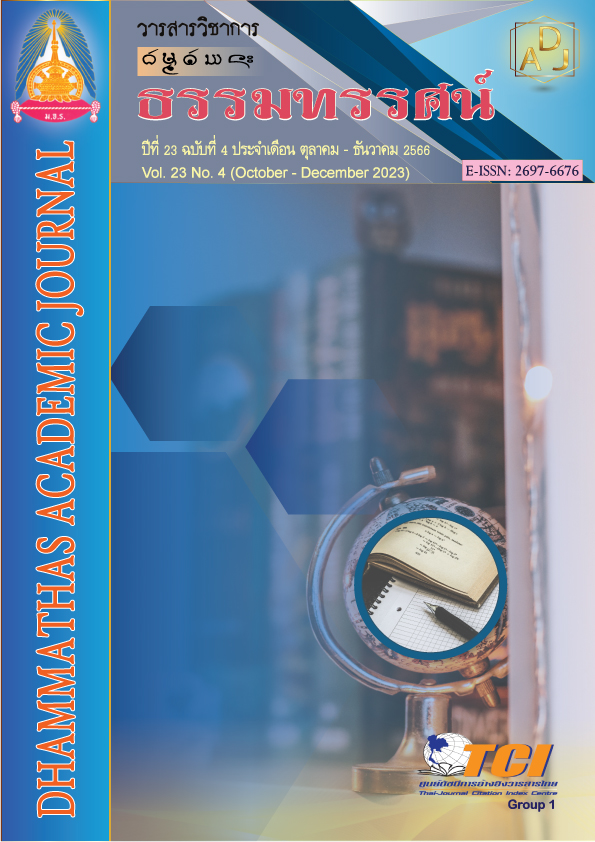An Analyze White Business Operations from the Perspective of Buddhist Ethics of Enterprises in Mueang District Nong Bua Lamphu Province
Main Article Content
Abstract
The research objectives were: 1) to study the white business operation of the enterprises in Muang District, Nong Bua Lamphu Province; 2) to study Buddhist ethics in white business operations; 3) to analyze white business operations from the perspective of Buddhist ethics of enterprises in Mueang District Nong Bua Lamphu Province. This study was carried out by means of the qualitative research methodology through the study of primary information from Tripitaka, secondary data from academic papers, and related research. There were 20 key informants. The obtained data were interpreted by descriptive analysis based on the inductive principle.
The research results were as follows:
1. White Business Operations in Nong Bua Lamphu Province faced problems such as people management and capital, which directly affected business operations that do not meet the goals. Therefore, the potential of business operations should be increased to be able to compete effectively with four management principles: people, money, materials, and management which lead to sustainability in business operations.
2. There are three main principles in Buddhist ethics: not doing evil, doing good, and purifying the mind used to control human behaviors that express physically, verbally, and mentally. The principles of Buddhist ethics used in business operations are Brahmavihāra, Saṅgahavatthu, and Iddhipāda, which lead to white business.
3. White business operations can occur by bringing Brahmavihāra for self-domination because leaders must behave to be respected by others. Saṅgahavatthu can be used to dominate people by creating good friends with colleagues who are mainly focused on the success of the organization. Iddhipāda can be used to occupy jobs to create personnel to have a love of work with faith as the basis, thus creating a commitment with a mind focused on the work they are responsible for. This is to prevent mistakes that will occur and the work process is monitored regularly. In this way, running a business leads to the success of the goals set.
Article Details

This work is licensed under a Creative Commons Attribution-NonCommercial-NoDerivatives 4.0 International License.
เพื่อให้เป็นไปตามกฎหมายลิขสิทธิ์ ผู้นิพนธ์ทุกท่านต้องลงลายมือชื่อในแบบฟอร์มใบมอบลิขสิทธิ์บทความ ให้แก่วารสารฯ พร้อมกับบทความต้นฉบับที่ได้แก้ไขครั้งสุดท้าย นอกจากนี้ ผู้นิพนธ์ทุกท่านต้องยืนยันว่าบทความ ต้นฉบับที่ส่งมาตีพิมพ์นั้น ได้ส่งมาตีพิมพ์เฉพาะในวารสาร วิชาการธรรม ทรรศน์ เพียงแห่งเดียวเท่านั้น หากมีการใช้ ภาพหรือตารางของผู้นิพนธ์อื่นที่ปรากฏในสิ่งตีพิมพ์อื่นมาแล้ว ผู้นิพนธ์ต้องขออนุญาตเจ้าของลิขสิทธิ์ก่อน พร้อมทั้ง แสดงหนังสือที่ได้รับการยินยอมต่อบรรณาธิการ ก่อนที่บทความจะได้รับการตีพิมพ์References
คำพอง งามภักดิ์. (2543). จริยธรรมธุรกิจ: ศึกษาเปรียบเทียบแนวคิดประโยชน์นิยมกับแนวคิดพระพุทธศาสนา. (วิทยานิพนธ์ศึกษาศาสตรมหาบัณฑิต). กรุงเทพฯ: มหาวิทยาลัยมหิดล.
พระครูพัฒนกิจจานุรักษ์ (สำเรียง เพ็ชราม). (2553). การศึกษาหลักสัมมาอาชีวะของพุทธศาสนาที่ปรากฏในหลักเศรษฐกิจพอเพียง. (วิทยานิพนธ์พุทธศาสตรมหาบัณฑิต). พระนครศรีอยุธยา: มหาวิทยาลัยมหาจุฬาลงกรณราชวิทยาลัย.
พระเทพเวที (ประยุทธ์ ปยุตฺโต). (2531). เศรษฐศาสตร์แนวพุทธ. กรุงเทพฯ: มูลนิธิโกมลคีมทอง.
พระธรรมปิฎก (ป.อ.ปยุตฺโต). (2540). เศรษฐศาสตร์แนวพุทธ. กรุงเทพฯ: สหธรรมิก.
_______. (2545). พจนานุกรมพุทธศาสตร์ฉบับประมวลธรรม. (พิมพ์ครั้งที่ 11). กรุงเทพฯ: สหธรรมิก.
พระธานี เขมธมฺโม (จำปา). (2550). ศึกษาสัมมาอาชีวะในพระพุทธศาสนา. (วิทยานิพนธ์พุทธศาสตรมหาบัณฑิต). พระนครศรีอยุธยา: มหาวิทยาลัยมหาจุฬาลงกรณราชวิทยาลัย.
พระพรหมคุณาภรณ์ (ป.อ.ปยุตฺโต). (2550). ธรรมนูญชีวิต. (พิมพ์ครั้งที่ 2). กรุงเทพฯ: พิมพ์สวย.
พระมหาสมโภช ฐิติญาโณ (ศรีพันธ์). (2535). ศึกษาวิเคราะห์เศรษฐศาสตร์ตามแนวพระไตรปิฎก. (วิทยานิพนธ์พุทธศาสตรมหาบัณฑิต). พระนครศรีอยุธยา: มหาวิทยาลัยมหาจุฬาลงกรณราชวิทยาลัย.
มหาจุฬาลงกรณราชวิทยาลัย. (2539). พระไตรปิฎกภาษาไทย ฉบับมหาจุฬาลงกรณราชวิทยาลัย. กรุงเทพฯ: มหาจุฬาลงกรณราชวิทยาลัย.
รัตนา อัตภูมิสุวรรณ. (2542). การศึกษาธุรกิจ. กรุงเทพฯ: ศูนย์การพิมพ์แก่นจันทร์.
ศักดิ์ชัย อนันต์ตรีชัย. (2550). จริยศาสตร์ในการดำเนินธุรกิจของพระพุทธศาสนานิกายเถรวาท. (วิทยานิพนธ์พุทธศาสตรดุษฎีบัณฑิต). พระนครศรีอยุธยา: มหาวิทยาลัยมหาจุฬาลงกรณราชวิทยาลัย.
สมคิด บางโม. (2519). ธุรกิจทั่วไป. (พิมพ์ครั้งที่ 2). กรุงเทพฯ: นำอักษร.
สมบูรณ์ ศาลยาชีวิน และคณะ. (2551). จริยธรรมในการดาเนินธุรกิจของนักธุรกิจในประเทศไทยเปรียบเทียบกับนักธุรกิจในประเทศสหรัฐอเมริกา. (รายงานการวิจัย). กรุงเทพฯ: สำนักงานกองทุนสนับสนุนการวิจัย.
สุภาวดี นัมคณิสรณ์. (2539). ธุรกิจกับพุทธจริยศาสตร์. (วิทยานิพนธ์อักษรศาสตรมหาบัณฑิต). กรุงเทพฯ: จุฬาลงกรณ์มหาวิทยาลัย.

